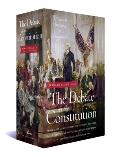“Bailyn tells us all we need to know”
The latest issue of the New England Quarterly is devoted to Bernard Bailyn, dean of the influential “Ideological” school of historians of the American Revolution and professor at Harvard University for many years.
Among the essays is Robert Allison’s description of working as one of Bailyn’s graduate students, teaching assistants, and research assistants.
During that time Bailyn was editing a collection of writings about the ratification of the U.S. Constitution for the Library of America. Allison shares this anecdote:
Bob Allison survived his stint with Prof. Bailyn and has become a prominent local professor himself—at Suffolk University, and at the head of the Colonial Society of Massachusetts and Revolution 250.
Among the essays is Robert Allison’s description of working as one of Bailyn’s graduate students, teaching assistants, and research assistants.
During that time Bailyn was editing a collection of writings about the ratification of the U.S. Constitution for the Library of America. Allison shares this anecdote:
For the biographical sketches, I began with a list of every person—all 134—quoted in the volumes, either as a writer or a speaker at a convention—and found what information I could. These posed different problems. Not the French diplomats—as I was working with the sketch of Louis-Guilaume Otto, Comte de Mosloy from the Biographe Universelle, my wife asked if Bailyn knew that I could not read French. No matter; with a dictionary I powered through. More troubling was Washington, or Franklin, about whom we know too much, or William Jones of Maine, about whom we know very little (and for someone named William Jones, unlikely to know more). . . .That’s certainly the sort of detail that would make me perk up and try to seek more information. Not unlike the death of John Lansing.
One of my favorite characters was Samuel Spencer of North Carolina, not so much for his accomplishments as for the lesson learned writing his biographical sketch. Born in Connecticut, Spencer went to Princeton in the 1750s then moved to North Carolina to practice law. This was enough to lead me to James McLachlan's Princetonians: 1748–1768. Spencer fought to suppress the North Carolina Regulators, served in the legislature, and became a judge, and he opposed ratification at both of the North Carolina conventions.
Judge Spencer's untimely end struck me as the most interesting part of his story. One warm April afternoon he sat, wearing a red hat, on his front porch in Anson County. In the warm afternoon sun, Spencer began to nod off. A turkey in the yard saw the bobbing red hat, took it for a challenge, and attacked the napping judge. Though Spencer fought off the bird, it had severely bitten his hand. Judge Spencer died of the infection.
My sketch of Spencer ended with this story—the warm afternoon sun, the red hat bobbing, the turkey attacking, the ensuing infection. Bailyn made a red X through the turkey story. In the next draft I condensed—taking out some extraneous details (the warm April sun). Again, he crossed it all out. I cut some more—was the red hat important? He crossed it all out again. This back and forth continued: I wrote and he crossed out. He never asked why I kept putting the story in; I never asked why he kept taking it out. Finally, as it all was going off to our heroes in New York [i.e., the publisher], I delivered a final version, sure that the turkey would not make his final cut.
When The Debate on the Constitution volumes appeared a few years later, and I saw them for the first time-on a shelf at the Harvard COOP, I immediately turned to volume 2, page 1013. There was Samuel Spencer, whose profile ends, “Died at home in Anson County on April 20, 1793, of an infected hand wound sustained from an attack by a turkey.”
Twelve words! It took me sixty-plus to retell the story above. Spencer is the only character for whom we give a cause of death, and without an unnecessary, extraneous, or distracting word Bailyn tells us all we need to know, in an elegant “wound sustained from an attack by a turkey.”
Bob Allison survived his stint with Prof. Bailyn and has become a prominent local professor himself—at Suffolk University, and at the head of the Colonial Society of Massachusetts and Revolution 250.


No comments:
Post a Comment